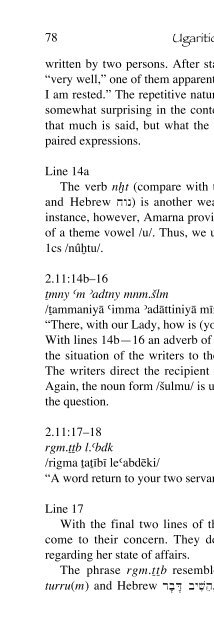- Page 2:
This page intentionally left blank
- Page 8:
A Primer on Ugarit
- Page 12:
for Jeanne for Alice
- Page 18:
viii Contents 3.8 From Tlmym to T r
- Page 22:
x Contents 7.7.5 Conjunctions 170 8
- Page 28:
Abbreviations ABD Anchor Bible Dict
- Page 32:
Acknowledgments Many people have co
- Page 38:
2 Ugaritic Primer
- Page 42:
4 Ugaritic Primer
- Page 46:
6 Ugaritic Primer
- Page 50:
8 Ugaritic Primer
- Page 54:
10 Ugaritic Primer
- Page 58:
12 Ugaritic Primer
- Page 62:
14 Ugaritic Primer
- Page 66:
16 Ugaritic Primer
- Page 70:
18 Ugaritic Primer
- Page 74:
20 Ugaritic Primer
- Page 78:
22 Ugaritic Primer
- Page 82:
24 Ugaritic Primer
- Page 86:
26 Ugaritic Primer
- Page 90:
28 Ugaritic Primer
- Page 94:
30 Ugaritic Primer
- Page 98:
32 Ugaritic Primer
- Page 102:
34 Ugaritic Primer
- Page 106:
36 Ugaritic Primer
- Page 110:
38 Ugaritic Primer
- Page 114:
3 Letters An Inductive Introduction
- Page 118:
42 Ugaritic Primer
- Page 122:
44 Ugaritic Primer
- Page 126:
46 Ugaritic Primer
- Page 130:
48 Ugaritic Primer
- Page 134:
50 Ugaritic Primer
- Page 138: 52 Ugaritic Primer
- Page 142: 54 Ugaritic Primer
- Page 146: 56 Ugaritic Primer
- Page 150: 58 Ugaritic Primer
- Page 154: 60 Ugaritic Primer
- Page 158: 62 Ugaritic Primer
- Page 162: 64 Ugaritic Primer
- Page 166: 66 Ugaritic Primer
- Page 170: 68 Ugaritic Primer
- Page 174: 70 Ugaritic Primer
- Page 178: 72 Ugaritic Primer
- Page 182: 74 Ugaritic Primer
- Page 186: 76 Ugaritic Primer
- Page 192: Letters 79 phrases employ an impera
- Page 196: Letters 81 3.6 LETTER FROM KING TO
- Page 200: Letters 83 3.7 2.14) LETTER FROM }I
- Page 204: Letters 85 3.8 LETTER FROM TLMYM TO
- Page 208: Letters 87 3.9 LETTER FROM KING OF
- Page 212: 2.38:23. w.ttb.}ank.lhm 52 2.38:24.
- Page 216: 3.10.2 Transcription (KTU 2.30) 2.3
- Page 220: Administrative Texts 93 activities.
- Page 224: Administrative Texts 95 the palace.
- Page 228: 5 Legal Texts KTU classifies ten te
- Page 232: Legal Texts 99 5.1.3 Notes and Comm
- Page 236: Legal Texts 101 possibility that th
- Page 240:
Legal Texts 103 5.2 }IWRKL RANSOMS
- Page 244:
Legal Texts 105 5.2.3 Notes and Com
- Page 248:
Legal Texts 107 9. /bitta {abdimalk
- Page 252:
Legal Texts 109 5.3 SÁMMN ESTABLIS
- Page 256:
5.3.2 Transcription (KTU 3.9) Obver
- Page 260:
Legal Texts 113 (Line on tablet mar
- Page 264:
Legal Texts 115 10. /}issa{u/ I sha
- Page 268:
6 Literary Texts Most of the major
- Page 272:
Literary Texts 119 R1.114:25 [ ]n.d
- Page 276:
Literary Texts 121 with the goddess
- Page 280:
Literary Texts 123 19 yhdy, from hd
- Page 284:
1.14:ii, 23 mm.db .lir 1.14:ii, 24
- Page 288:
1.14:i, 36 }il.yrd.bdhrth 1.14:i, 3
- Page 292:
1.14:ii, 50 mddth.k}irby 1.14:ii, 5
- Page 296:
Literary Texts 131 32 {dn has been
- Page 300:
Literary Texts 133 1.100:35 tqrul p
- Page 304:
1.100:23 nhs¥.ys¥lhm.nhs¥.{qs¥r
- Page 308:
Literary Texts 137 6.5 BA‘AL CYCL
- Page 312:
1.19: i, 17 ly.wbmt(?)-hmssr(?)-(?)
- Page 316:
Literary Texts 141 1.19: ii, 28 b(?
- Page 320:
1.19: iii, 31 b}l.ytbr.b}l.ytbr.d}i
- Page 324:
Literary Texts 145 1.19: iv, 35 kly
- Page 328:
Literary Texts 147 1.23:28 s¥d.}il
- Page 332:
7.1 ORTHOGRAPHY 7 Grammatical Préc
- Page 336:
Table 7.1 Table of Consonants Gramm
- Page 340:
Grammatical Précis 153 The bi-labi
- Page 344:
Grammatical Précis 155 in literary
- Page 348:
Grammatical Précis 157 7.3.4.2 d a
- Page 352:
and in the masculine plural. Gramma
- Page 356:
Grammatical Précis 161 is associat
- Page 360:
Grammatical Précis 163 7.4.8.6 Roo
- Page 364:
Grammatical Précis 165 7.5.1.2 Num
- Page 368:
Grammatical Précis 167 middle cons
- Page 372:
Grammatical Précis 169 7.6.7 Suffi
- Page 376:
Grammatical Précis 171 Hiphil impe
- Page 380:
Grammatical Précis 173 above). 16
- Page 384:
Grammatical Précis 175 Gp qutila q
- Page 388:
Grammatical Précis 177 qlt /qa®la
- Page 392:
Grammatical Précis 179 7.7.3 Vocat
- Page 396:
Glossary 181 Arabic undoubtedly rec
- Page 400:
ga-ri-ta/) }ad/}adn father; lord (c
- Page 404:
Glossary 185 hÎnDmVlAa) }aln oak (
- Page 408:
Glossary 187 ; ; }atrt Athirat (cp.
- Page 412:
Glossary 189 ; dblt fig cake (cp. H
- Page 416:
h hby [DN?] demon (?) (see Isa. 26:
- Page 420:
Glossary 193 T¸BH¸ to slaughter (
- Page 424:
Glossary 195 “perfection”; Akk.
- Page 428:
Glossary 197 m}ad plenty, much (cp.
- Page 432:
mtntm loins (cp. Akk. matnu “cord
- Page 436:
skn stela, monument (cp. Akk. sûˆ
- Page 440:
Glossary 203 face (cp. Akk. paœtu;
- Page 444:
qr voice, noise (cp. Mish. Heb. rqr
- Page 448:
SÁLW to repose (cp. Heb. wElDv) S
- Page 452:
T˛KM to carry on the shoulder tkm
- Page 456:
Resources for Further Study 211 Zuc
- Page 460:
Resources for Further Study 213 Vir
- Page 464:
Resources for Further Study 215 lan
- Page 468:
Resources for Further Study 217 Mor
- Page 472:
Resources for Further Study 219 Siv
- Page 476:
Resources for Further Study 221 9.1
- Page 480:
tlt 140, 143, 12 Carchemish 14 Cypr
- Page 484:
{my 58, 60, 65, 66, 67, 86 {rpt 139


